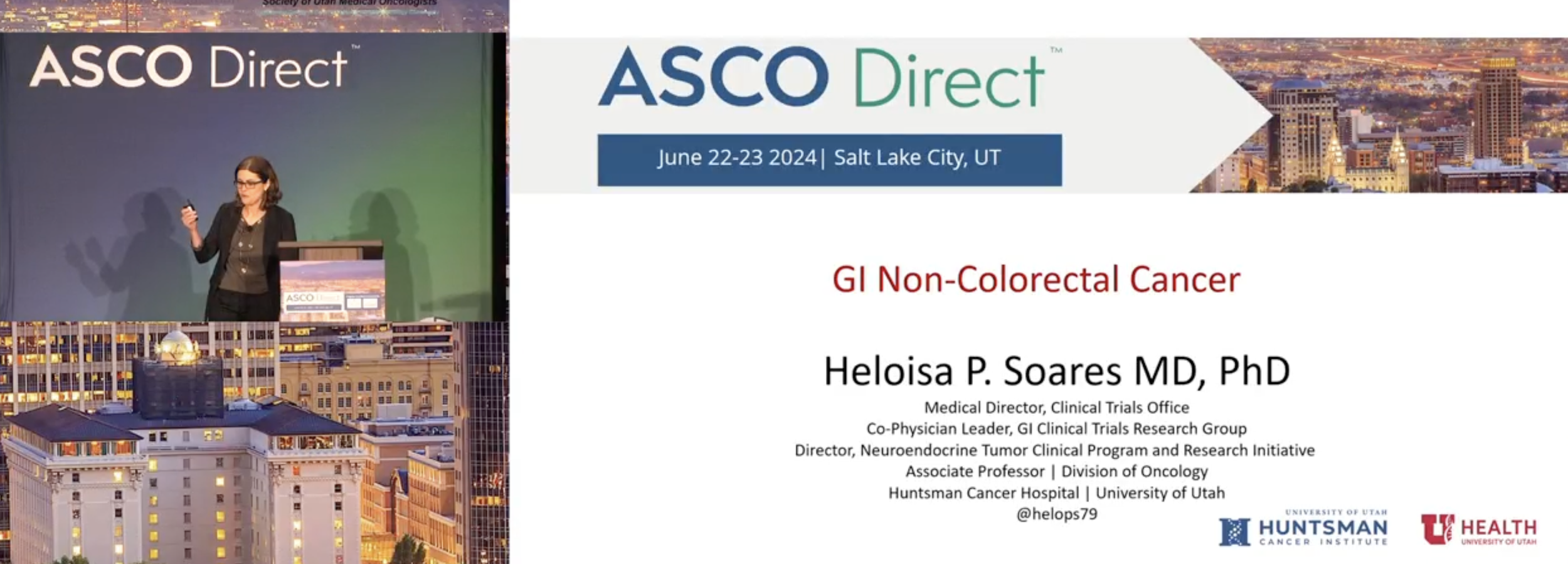ASCO Salt Lake City: Dr Soares Discusses Results from CheckMate 9DW Trial
Presented by:
Heloisa P. Soares MD, PhD, Huntsman Cancer Institute, University of Utah
Meeting:
Total Health ASCO Direct™ Salt Lake City
The Bottom Line
Tyrosine kinase inhibitor drugs like sorafenib and lenvatinib have been the standard of care for first line treatment of patients with advanced hepatocellular carcinoma (HCC) that is not amenable to surgery. Results from a study reported at ASCO 2024 suggest that a combination of immunotherapy drugs can improve survival over these agents, with a benefit in survival seen after 24 and 36 months of treatment.
Background:
For over a decade, tyrosine kinase inhibitor (TKI) drugs such as sorafenib or lenvatinib have been the standard of care for initial treatment of patients with advanced hepatocellular carcinoma (aHCC). Immunotherapy is a different type of cancer treatment that helps the body’s immune system better recognize and attack cancer cells. In previous studies, the use of 2 immunotherapy drugs, nivolumab and ipilimumab in combination (NIVO/IPI) was shown to be effective for patients with aHCC previously treated with sorafenib, and the NIVO/IPI regimen was granted accelerated approval for patients with aHCC. In the phase III CheckMate 9DW trial, the NIVO/IPI regimen was compared with TKI treatment (either lenvatinib or sorafenib) in patients with HCC that was not surgically treatable (unresectable).
Trial Design and Patients:
Patients with previously untreated (treatment naïve) unresectable HCC (N=668) were treated with the NIVO/IPI regimen or the investigators choice of TKI for a maximum duration of 2 years. The primary endpoint of the trial was overall survival (OS), with a key secondary endpoint being the overall response rate (ORR). Most patients in this trial were male (>80%) and the median age was 65-66 years; the trial was conducted primarily at sites in Asia, North America, and Europe. Importantly, Dr Soares noted that patients in the trial did not have main portal vein invasion, which is a good prognostic indicator.
Main Trial Results:
The median OS in the trial was significantly longer with the NIVO/IPI regimen as compared with the TKI regimen with a median 23.7 month survival in the NIVO/IPI arm as compared with 20.6 months in the TKI arm, and the difference in survival was statistically significant (P=0.018). Rates of OS were also higher after 24 and 36 months of therapy. There was also a significant difference between the respective groups in ORR (36% versus 13%; P<0.0001), and the duration of response was longer (30.4 months versus 12.9 months).
Adverse Events and Toxicities:
The most commonly occurring adverse events in the NIVO/IPI group were rash (pruritis) and increases in liver enzymes, whereas in the TKI group, hypertension, diarrhea, and hand-foot syndrome were most common. Overall rates of treatment related adverse events (TRAEs, 84% and 91%, respectively) and serious TRAEs (28% vs. 14%, respectively) were comparable in the NIVO/IPI and TKI groups.
Conclusions and Faculty Insights:
Dr Soares noted the NIVO/IPI regimen to be a viable option for patients with aHCC based on these results, but notes that other immunotherapy combination regimens, such as atezolizumab and bevacizumab, have also been shown to be effective over TKIs, and that treatment options in this setting continue to evolve. While it is difficult to draw conclusions when comparing different trials, Dr Soares believes the NIVO/IPI regimen may be a good option, particularly for patients who are not candidates for atezolizumab and bevacizumab. In addition, she believes that further research is essential to evaluate how best to use these different treatment options in sequence for patients with aHCC.
Speaker Disclosure Information:
Dr Soares reported the following disclosures for this presentation: Consulting: Novartis, ITM, Exelixis, BMS, Ipsen.

